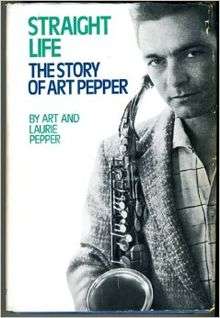Straight Life (book)
 Hardcover edition | |
| Author | Art Pepper and Laurie Pepper |
|---|---|
| Country | United States |
| Language | English |
| Genre | Non-fiction |
| Publisher | Schirmer Books |
Publication date | 1979 |
| Media type | |
| Pages | 517[1] |
| ISBN | 0028718208 |
Straight Life: The Story of Art Pepper is the (auto)biography of jazz musician Art Pepper, co-written by the saxophonist and his wife, Laurie Pepper. It was first published in 1979, by Schirmer Books.
Background
Art Pepper began recording himself talking about his life around 1973, "as an act of catharsis and stabilization".[2] The tapes formed the basis for the writing and forming of the book.[2]
Contents
The book is mainly a description of events in Art Pepper's life.[3] He details his early sexual anxiety; his turning to alcohol, marijuana and harder drugs, leading to periods in prison; marriage and divorce; developing racism; and addiction treatment at Synanon.[4] He also discusses his music, including his influences, attention to tone in his playing, and his philosophy towards his own performances.[4] His despair, sense of inevitability about the course of his life, and lies and contradictions combine to accentuate the impression of honesty in the account of his life.[4] Added to his story are contributions from friends and family members,[4] plus reprinted articles from DownBeat magazine.[5] These often contrast with his own account of events.[5] The book also contains Pepper's discography to June 1979.[5]
Reception
Whitney Balliett, critic and reviewer for The New Yorker, commented that Pepper's writing displayed "the ear and memory and interpretative lyricism of a first-rate novelist".[2] Lewis Porter suggested that "Pepper seems to have been motivated by a compulsion to bare it all, with a minimum of interpretation."[6] The Washington Post's book reviewer, Jonathan Yardley, wrote that "it is my hunch, [...] or perhaps more accurately my hope, that sooner or later it will come to be recognized as a work of commanding power, withering candor and raw artistry – certainly the best of the many jazz autobiographies, and much more than that."[7] In Yardleys's view, the book was written "not merely to exorcise his own demons but also to destroy the jazz myth, to prove that 'Young Man With a Horn' is a lie."[8]
A Billboard reviewer in 1994 commented that "Few modern autobiographies can rival 'Straight Life' in sheer horror and power".[9] Literary scholar Terry Castle described the book in 2004 as "a rhapsodic riff on self-destruction. It is also one of the greatest, saddest autobiographies ever written".[10]
Publication
The first edition was published by Schirmer Books in 1979.
The book was republished in an updated form in 1994; this version added an afterword that detailed Pepper's life between 1979 and his death in 1982.[11] The afterword was written by Laurie Pepper; the book also included an introduction by jazz critic Gary Giddins.[9]
References
- ↑ Porter 1982, p. 296.
- 1 2 3 Balliett, Whitney (January 7, 1980) "Straight Life". The New Yorker. 55. p. 84.
- ↑ Porter 1982, p. 298.
- 1 2 3 4 Giddins, Gary (February 18, 1980) "Art Pepper Talks Straight". The Village Voice. p. 74.
- 1 2 3 Porter 1982, p. 299.
- ↑ Porter 1982, pp. 298–9.
- ↑ Yardley 1982, p. C1.
- ↑ Yardley 1982, p. C2.
- 1 2 Morris, Chris (June 18, 1994) "Straight Life: The Story of Art Pepper by Art & Laurie Pepper". Billboard. p. 39.
- ↑ Castle, Terry (September 2004) "Mirror, Mirror". The Atlantic Monthly. 294/2. p. 139.
- ↑ Bailey, C. Michael (May 29, 2014) "Straight Life – The Story of Art Pepper by Art and Laurie Pepper". AllAboutJazz.
- Bibliography
- Porter, Lewis (1982). "Trane 'n Me: (A Semi-Autobiography); A Treatise on the Music of John Coltrane. By Andrew Nathaniel White. Washington, DC: Andrew's Musical Enterprises, 1981. 64 pp. Straight Life: The Story of Art Pepper. By Art and Laurie Pepper. New York: Schirmer; London: Collier Macmillan, 1979. 517 pp.". Popular Music. 2. doi:10.1017/s0261143000001392.
- Yardley, Jonathan (June 21, 1982). "Straight Talk from a Jazz Giant: Jazzman Art Pepper". The Washington Post.